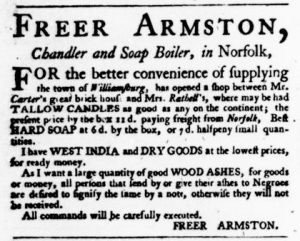What was advertised in a colonial American newspaper 250 years ago this week?

In the spring of 1769, Freer Armston,, a chandler and soap boiler in Norfolk, Virginia, attempted to enlarge his market by expanding his operations into Williamsburg. He placed an advertisement in Purdie and Dixon’s Virginia Gazette to inform prospective customers that he had opened a new shop where he sold “TALLOW CANDLES as good as any on the continent.” With such a bold statement, Armston favorably compared his wares to any others that consumers could acquire.
To make his candles even more attractive, he took the unusual step of naming their price in his advertisement: “by the box 11 d. paying freight from Norfolk.” Advertisers rarely listed prices in eighteenth-century newspapers, though many often made general appeals to low or reasonable prices. Readers likely knew what to expect to pay for a box of tallow candles from other chandlers and shopkeepers in Williamsburg. As a newcomer, Armston attempted to stimulate interest in his merchandise by allowing prospective customers to assess on their own whether he offered a deal. He did the same for his “Best HARD SOAP at 6d. by the box, or 7d. halfpenny [sic] small quantities.” He was not as verbose about the quality of his soap, simply describing it as “Best,” and instead emphasized the price and potential savings by buying in bulk. Customers saved twenty percent when they purchased an entire box of hard soap.
Armston also sought to establish that he was a careful and responsible entrepreneur. In addition to selling candles and soap, he asked readers to provide him with supplies, especially “good WOOD ASHES” used in the production of soap, for which he offered “goods or money.” He was vigilant when it came to accepting ashes from Black men and women, assuming that some did not acquire them by legitimate means. Armston instructed that “all persons that send by or give their ashes to Negroes” must also send a note specifying that they had done so or else he would not accept them. The chandler and soap boiler was not about to give “goods or money” to Black people who could not demonstrate how they came into possession of ashes they delivered to his shop. In addition to offering quality goods at low prices, Armston depicted himself as a good neighbor who attended to maintaining proper order in his business dealings.
